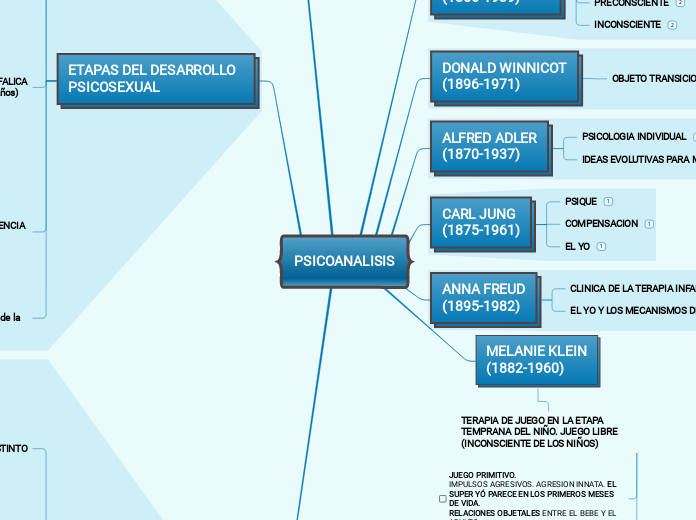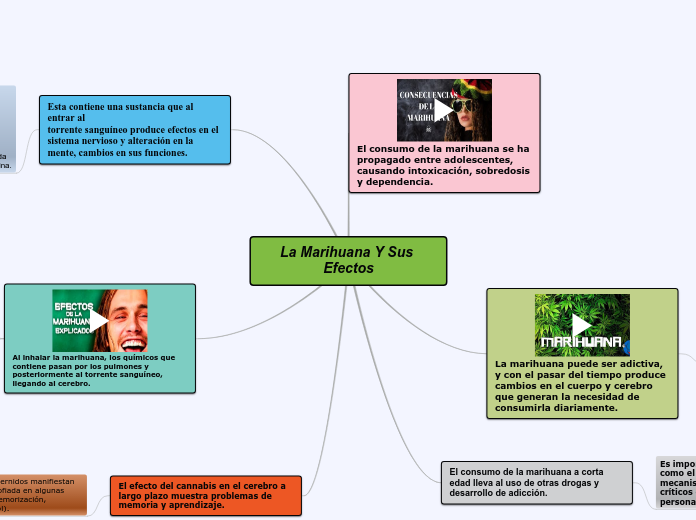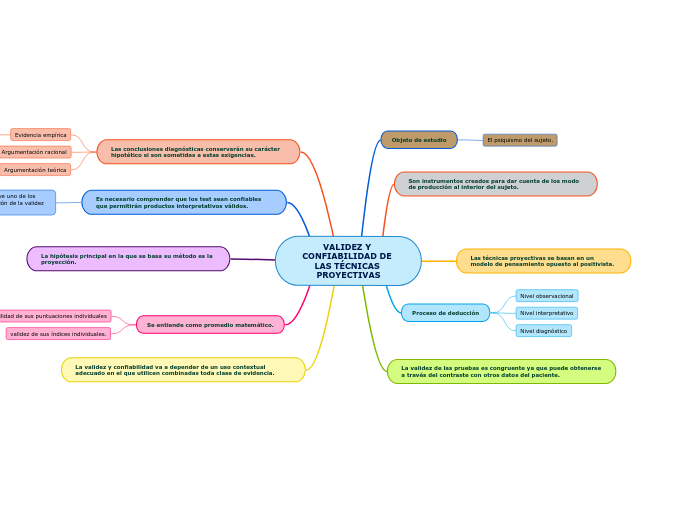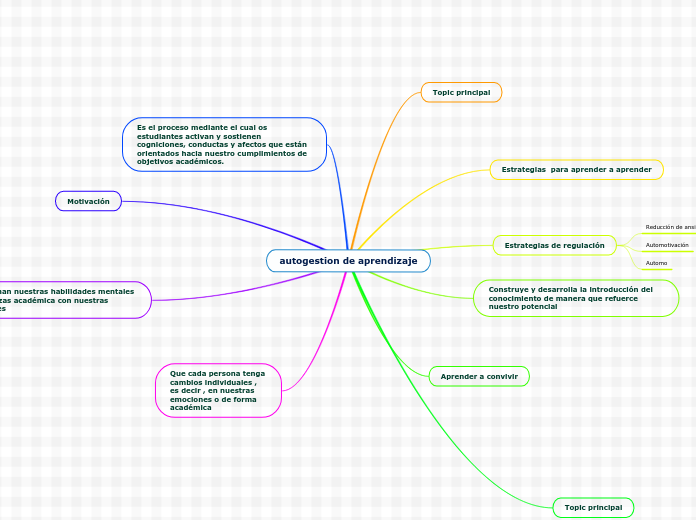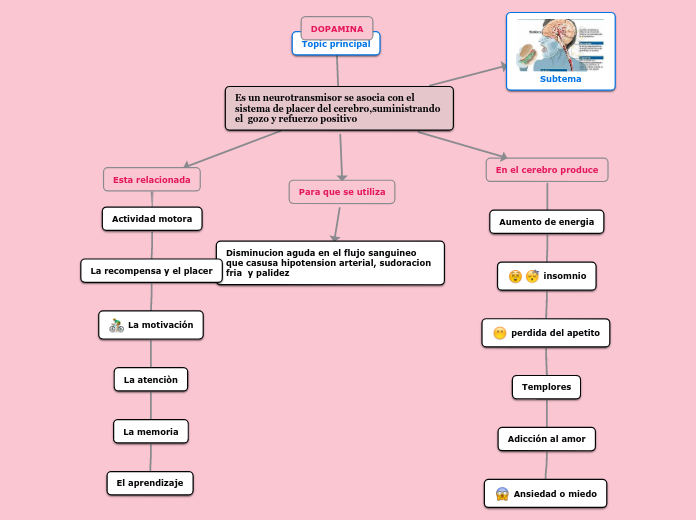PSICOANALISIS
The part of speech is a category to which a word is assigned according to its syntactic functions. In English the main parts of speech are noun, pronoun, adjective, determiner, verb, adverb, preposition, conjunction, and interjection.
PULSION E INSTINTO Y MECANISMOS DE DEFENSA
An interjection is used to express emotion in a sentence.
Think of other interjections!
MECANISMOS DE DEFENSA
Son aquellos mecanismos inconscientes que las personas utilizan para defenderse de algo que les puede generar ansiedad o angustia en su realidad (Cloninger, 2003).
SUBLIMACION. Este mecanismo intercambia cosas que se quieren hacer, pero que no son adecuadas para la sociedad (Cloninger, 2003)
Cuando se tiene algún deseo sexual muy fuerte. Para equilibrar esa situación optar por tomar clases de arte o hacer ejercicio.
REGRESION. La persona busca regresar a una etapa cómoda, de manera que le ayude a mantener un equilibrio. (Cloninger, 2003)
Cuando una persona se encuentra en una situación vulnerable y decide regresar a un estado, situación o lugar que le permita estar más tranquilo.
AISLAMIENTO. Sirve para evitar que algunos aspectos puedan provocar ansiedad (Cloninger, 2003)
No acordarse de una situación muy dolorosa, para que no afecte el sentido de la realidad.
PROYECCION. Se atribuye a otras personas, animales u objetos. Cualidades que se tienen por uno mismo (Cloninger, 2003)
Alguien le dice a una persona que ve muy cansada, aunque en ese momento esa persona esté muy activa, lo que indica que quien realmente necesita descansar es quien emitió el comentario.
FORMACION REACTIVA. Sentimientos contrarios a lo que realmente se desea (Cloninger, 2003)
Se puede manifestar mucho amor, acercamiento o cuidado exagerad, cuando en realidad se tiene odio.
RACIONALIZACION. Justificar o argumentar de una manera aceptable acciones que no se aprueban (Cloninger, 2003)
Cuando se da alguna explicación que puede ser admisible ante otros de algo que se hizo y que no es adecuado, pero se disfrazan los verdaderos motivos y se muestran acciones que de alguna manera son permisibles.
NEGACION. Implica no aceptar ninguna situación Puede alterar al YO (Cloninger, 2003)
Negar que se fue una persona, pues esto puede provocar ansiedad.
REPRESION. Trata de alejar algo de la conciencia y mantenerlo oculto (Cloninger, 2003)
EJEMPLO
Reprimir un sentimiento por otra persona
PULSION
Fuerza (intensidad) o un empuje hacia un fin hasta alcanzar un objeto que proviene de una fuente.
Ejemplo
Cuando una persona tiene hambre debe cubrir esta necesidad, la pulsión son las acciones que realiza y la intensidad con que cubre esta necesidad.
PULSION DE MUERTE
THANATOS
(Tortosa y Civera, 2003)
Violencia, suicidio y guerras
ENERGIA SEXUAL
Libido
PULSION DE VIDA
EROS
(Tortosa y Civera, 2003)
Amor y cuiado personal
INSTINTO
El instinto es algo innato
4 elementos:
(Cloninger, 2003)
Objeto
Es aquello que permite alcanzar la satisfacción de la necesidad.
Fin
Es trabajar en la satisfacción de la necesidad hasta que ya no exista.
Fuente
Es la parte del cuerpo en la que se presenta una necesidad.
Intensidad
Energía o fuerza para satisfacer el instinto de la necesidad.
Comportamiento que se presenta el atener alguna necesidad biológica.
Ejemplo.
Cuando una persona tiene hambre debe cubrir esta necesidad.
ETAPAS DEL DESARROLLO PSICOSEXUAL
An adverb is used to describe a verb, but it can also describe an adjective or another adverb.
Adverbs normally help paint a fuller picture by describing how something happens.
ETAPA GENITAL
(De la pubertad hasta el desarrollo de la personalidad)
Aparece el orgasmo
Sexualidad adulta.
Integración de todos los rasgos de la personalidad. Atracción y enamoramiento.
Cambios físicos
Impulsos sexuales
Competencias en todos los ámbitos
ETAPA DE LATENCIA
(6 a 11 años)
The intensifiers strengthen adverbs adjectives and adverbs and down- toners make them weaker.
Su relación con sus pares está cambiando y buscan pertenecer a un grupo.
Fairly, Rather
"La elaboración de los rasgos y habilidades previamente adquiridos" (Dicaprio, 1989)
Periodo de tranquilidad, es decir, periodo latente.
Inicia la pubertad
Aparece el sentimiento e pudor
ETAPA FALICA
(3 A 5 años)
APEGO
COMPLEJO DE ELECTRA.
La niña ve a su padre como objeto sexual. Si descubre que no tiene pene podría culpar a la madre. Relación complicada (Dicaprio, 1989). La niña puede minimizar sus rasgos femeninos.
COMPLEJO DE EDIPO.
Acercamiento o tracción sexual que el niño desarrolla por la madre, celos hacia el padre. El niño puede rechazar su papel masculino.
Genitales fuente de placer. Diferencias entre hombres y mujeres. Los niños amplían su círculo social. Pueden aparecer rasgos como humildad, orgullo, vergüenza, aislamiento.
g
ETAPA ANAL
(18 meses a 3 años)
Repercute en la personalidad del niño. Puede reflejar obediencia o desafío (Dicaprio, 1989). Impacta en el orden o desorden. Precisión o vaguedad.
La fuente de placer es el ano. Control de esfínteres. Placer al expulsar las heces. (Morris y Maisto, 2005)
ETAPA ORAL
(18 meses de vida)
Ejemplo. En los adultos hay hábitos o conductas orales, como fumar o morder.
La boca es la primera fuente de conocimiento. Las necesidades se satisfacen. Determinación de los rasgos de la personalidad.
Optimismo-pesimismo.
APARATO PSIQUICO
A numeral is a word or phrase that describes a numerical quantity.
Some theories of grammar use the word 'numeral' to refer to cardinal numbers that act as a determiner to specify the quantity of a noun, for example the 'two' in 'two hats'.
ESTRUCTURA DE LA MENTE
ELLO. Se rige por el principio del placer. Es una función de las pulsiones biológicas y quiere estar satisfecho en el momento. Está en conflicto con el YO y el SUPERYÓ debido a que se presenta en el momento que se necesita.
Ejemplo. Siguiendo con el ejemplo de la cita el ELLO se presenta cuando ambas personas están coqueteando pues existe un deseo.
SUPERYÓ. Juzga y critica. Está para cumplir reglas. Sentimiento de culpa. Genera conciencia y limita algunas acciones.
Ejemplo. Dentro del ejemplo de la cita el SUPERYÓ le indica al Yo que no es correcto buscar a la persona en ese momento pues apenas es la primera cita y no es parte de los valores que le han enseñado.
YO. Controla las percepciones. Parte racional. Sentido de realidad.
Ejemplo. Si se tiene una cita el YO se enfocará en lo siguiente: ¿a qué hora será la cita?, ¿en qué lugar?, etc.
TOPOGRAFIA DE LA PSIQUE
INCONSCIENTE.
Pulsiones, deseos, instintos, fantasías, recuerdos que pueden causar dolor y provocar ansiedad. Ejemplo. En sueños, olvidos, chistes o cuando se dice una cosa por otra.
CONSCIENTE.
Sentido de realidad.
Ejemplo. En una fiesta observas a los individuos, escuchas la música que están reproduciendo, platicas con tus conocidos, delo que ha pasado ese día, o sobre recuerdos que tienes presentes.
PRECONSCIENTE.
Permite el acceso a la conciencia.
Ejemplo. Al tratar de recordar lo que se hizo el día de ayer. Estas acciones se quedan guardadas en la consciencia.
MELANIE KLEIN
(1882-1960)
TERAPIA DE JUEGO EN LA ETAPA TEMPRANA DEL NIÑO. JUEGO LIBRE (INCONSCIENTE DE LOS NIÑOS)
DESCRIBE AL AMOR NO SOLO COMO CUESTION EROTICA SINO COMO UNA PREOCUPACION AUTENTICA POR EL OTRO.
JUEGO PRIMITIVO.
IMPULSOS AGRESIVOS. AGRESION INNATA. EL SUPER YÓ PARECE EN LOS PRIMEROS MESES DE VIDA.
RELACIONES OBJETALES ENTRE EL BEBE Y EL ADULTO.
ANNA FREUD
(1895-1982)
An article is a word used to modify a noun, which is a person, place, object, or idea. Technically, an article is an adjective, which is any word that modifies a noun.
EL YO Y LOS MECANISMOS DE DEFENSA
Indefinite articles are the words 'a' and 'an.' Each of these articles is used to refer to a noun, but the noun being referred to is not a specific person, place, object, or idea. It can be any noun from a group of nouns.
REPRESION
NEGACION
RACIONALIZACION
FORMACION REACTIVA
PROYECCION
AISLAMIENTO
REGRESION
SUBLIMACION
CLINICA DE LA TERAPIA INFANTIL
It refers directly to a specific noun or groups of nouns.
TERAPIA DE JUEGO
CARL JUNG
(1875-1961)
A pronoun is a word that can be used in place of a noun, typically after the noun itself has already been stated.
EL YO
Demonstrative pronouns are used to demonstrate (or indicate). This, that, these, and those are all demonstrative pronouns.
ALGO CONSCIENTE. CENTRO DE LA VOLUNTAD DE LAS PERSONAS.
COMPENSACION
Possessive pronouns are used to show possession. The possessive pronouns are mine, yours, his, hers, ours, and theirs.
CONSCIENTE E INCONSCIENTE ESTAN EN UNA RELACION DE COMPENSACION
PSIQUE
The personal pronouns are I, you, he, she, it, we, they. More often than not (but certainly not always), they replace nouns representing people.
PERSONALIDAD: EL SÍ MISMO
ALFRED ADLER
(1870-1937)
An adjective is a word that's used to describe a specific noun and to provide more detail to the listener.
IDEAS EVOLUTIVAS PARA MEJORAR
Superlative adjectives demonstrate a higher level of comparison between entities.
LUCHA POR LA SUPERIORIDAD ESFUERZO POR LOGRAR LA PERFECCION
INFERIORIDAD DEL ORGANO. IMPULSO AGRESIVO PROTESTA MASCULINA
PSICOLOGIA INDIVIDUAL
Expresses a comparison between two entities or groups of entities in quality or degree.
PERSPECTIVA SOCIAL , NO BIOLOGICA . COMPLEJO DE INFERIORIDAD.
LUCHA CONSTANTE DE LOS INDIVIDUOS PARA MEJORAR SU VIDA
DONALD WINNICOT
(1896-1971)
A noun is defined as a person, place, thing or idea. Proper nouns always begin with a capital letter. Common nouns, which are general words, such as 'cars,' are not capitalized.
OBJETO TRANSICIONAL
Proper nouns are the names of specific people or places. They should always begin with a capital letter.
TIENE MUCHA IMPORTANCIA PARA EL NIÑO, YA QUE ES EL SOPORTE PARA CUANDO SE EMPIECE A SEPARAR DE SU MADRE
TOALLA, PEUCHE, COBIJA
SIGMUND FREUD
(1856-1939)
A verb is an action word or 'doing' word that signifies movement in some way.
INCONSCIENTE
An auxiliary verb helps the main (full) verb and is also called a 'helping verb.' With auxiliary verbs, you can write sentences in different tenses, moods, or voices.
ELLO, YO SUPERYÓ. INTERPRETACION DE LOS SUEÑOS MATERIA DE LAS PULSIONES ACTOS FALLIDOS
ESTRUCTURA DE LA PERSONALIDAD
PRECONSCIENTE
A participle is a verb form that can be used as an adjective or to create a verb tense. There are two types of participles: Present participle (ending -ing) and Past participle (usually ending -ed, -d, -t, -en, or -n).
The winning athlete gets a trophy.
CONSCIENTE
A modal is a type of auxiliary (helping) verb that is used to express: ability, possibility, permission or obligation. The main modal verbs in the English language are: can, could, may, might, must, shall, should, will, would.
I might go to the park if I get my homework done.
3 NIVELES DE CONCIENCIA
A linking verb connects the subject with a word that gives information about the subject, such as a condition or relationship.
Create sentences
You look exhausted after studying all night.
